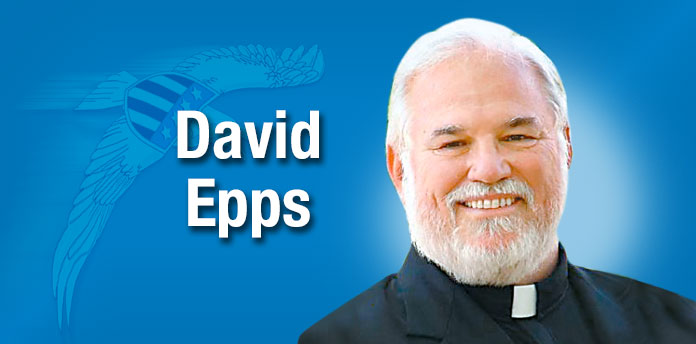Over the years, I have consistently received a certain type of criticism. Not that it is the only category of criticism that has come my way — but this particular one has been a regular occurrence throughout the years. The origin of it is most often from non-believers, nominal Christians, or believers who have a lack of knowledge about the Bible.
The criticism goes something like this” “I can’t believe that, as a man of the cloth, you …” or, “It shocks me that a minister would believe that …” or, “As a Christian minister you should keep silent on such things.”
In other words, if I voice an opinion that runs counter to the opinion of some of those in the categories above, it is often not the opinion that is attacked, it is my very person.
Christians, especially members of the clergy, are to be “nice,” “kind,” and most of all, “silent.” A number of people over the years have held that view and used that perspective to treat ministers as a doormat, believing them to be weak, rather than meek, and a bit cowardly at their core.
And, I have to admit, there have been times when I have bought into that way of thinking and allowed myself to be verbally, mentally, and spiritually abused — sometimes even by members of the churches I served.
But, referencing the Bible, while God called his people to be meek (“the meek shall inherit the earth”), he did not call them to be weak. In truth, the opposite call has been given.
Often, the divine directive extended to God’s people is to “be strong and courageous,” to “be not afraid,” to “be bold,” to “fight the good fight,” and so forth. The Church, and Christians — leaders in particular — are called to stand for biblical truth as they understand it.
For example, I believe that abortion is a moral and biblical issue, not merely a political and social one, although it is that to some people. Thus, I am an opponent of abortion and have stood my ground on that issue in the face of political opposition and the threat of arrest.
I believe that racism is a biblical and moral issue and, in 1983, declined to serve as the pastor of a church that manifested bigoted attitudes toward black people, even though they voted me in 100%.
I believe that same-sex relationships are biblical and moral issues, and so are all sexual relationships outside of marriage.
On the other hand, I have opinions about the 2nd Amendment, about vaccines, about capital punishment, religious conscientious objection, and a host of other issues that I believe are not clear biblical or moral issues (or that there are various interpretations of biblical examples), so I do not present sermons or church teachings about those.
I will respond if asked, but the opinion is mine and those who disagree are free to have their own thoughts without my getting emotionally entangled.
A number of books have been authored over the years on the subject of why men, much more than women, avoid the Church. One book, with an in-your-face- title is “Why Men Hate Going to Church.” Another is, “The Church Impotent.” Both are excellent reads and both make the case that much of the church has become feminized. That is, masculinity is ignored, devalued, and perhaps even suppressed.
I once visited a church out West for a conference in which the sanctuary walls were pink, the light fixtures were brass and glass chandeliers, the carpet was white and the trim was painted a cream color. A colleague asked me what I thought and I said, “It looks like a huge French bordello,” or what I imagine one would look like, anyway.
It doesn’t help when songs are sung that encourage people to “dance with Jesus.” That may be fine for some but most men do not see themselves doing the slow dance with a masculine God.
And that’s leads to another issue: Over time, Jesus has become portrayed as a weak, feminized, emaciated, pitiful, guru who is a sweet, precious, pushover who teaches good principles and never, ever offends anybody. And, of course, Christians are to follow this example. That view is a caricature that is the very opposite of the biblical Jesus.
The Old Testament is replete with passages that proclaim that “The Lord is a warrior,” or, “the Lord is with me like a dread champion,” and “the Lord your God in your midst is a victorious warrior.” And if people believe that Jesus is not a bold, masculine, confrontative entity (although one with sacrificial love and compassion), they need to read the Gospels and, especially, Revelation.
The church that values men, masculinity, and understands that, within every man, beats the heart of a potential warrior, will have more success in reaching and retaining men.
It is an interesting fact to me that all of my denomination’s clergy in Tennessee, and a strong minority of our clergy in Georgia have either military or law enforcement backgrounds. And those who do not are strong leaders and “real men,” if I can use that term without being blasted by the “woke” folks.
They are all loving, compassion, nice, and kind people — no no one walks all over any of them, inside the church or out.
Of course, it follows that the Church is to mimic this weak caricature of Jesus and always just be “nice, and kind” and, above all, silent in the face of wrong-doing. It is true that most of the correction given in the New Testament is directed toward fellow believers. For example:
“Warn a divisive person once, and then warn them a second time. After that, have nothing to do with them. You may be sure that such people are warped and sinful; they are self-condemned.” Titus 3:10-11 NIV
Pretty strong language and no subtlety. The Apostle Paul writing to the church at Corinth points out the sexual sin of a member and advocated strong action, which the church takes.
So, no, Christians do not have to lose their voice or their beliefs when face to face with wrong or evil, wherever it is found. Most martyrs throughout history were not murdered simply for their beliefs but because those beliefs they held were seen as a threat to the political or religious status quo.
Society, as it always has, tries to diminish and denigrate people and institutions of faith that they deem threatening to the social order. And, sadly, many churches and denominations have caved in to the pressure and have been conformed to the world.
Those who persist in traditional, historic practices, values and beliefs are told to “just be nice, just be kind, sit down, and shut up.”
Years ago, I was a vice-president in a certain political party in the county where I lived. I was a delegate to the state convention. Yet, politics, even within the local party, was hard-ball, mean, nasty, and aggressive.
One lady, a member of the party, said, “I don’t see how you, a man of the cloth, can be part of something like this.” In this case, it was not an attempt to get me to shut up. It was a sincere observation.
She was correct. In my role as a spiritual father and shepherd, I concluded it was not for me. I withdrew from leadership and have never engaged in that type of political action since. That’s not to say that I don’t vote and support candidates, because I do. But their principles and policies are far important to me than the party they represent.
So, yes, I am a man of the cloth, a minister of Christ, and most people who know me, I think, would say that I am a loving, caring, compassionate person. Not everyone would agree, especially those I have had to confront.
It is said of Moses, who was described as a “meek man,” that, “Before God, he bowed like a reed in the wind but, before the people, he stood as strong as an oak tree.”
I strive to be meek. But no man, no Christian, certainly no church, should embrace being weak. After all, there is a difference and the one we follow, and the one we serve, is a warrior.
[David Epps is the Rector of the Cathedral of Christ the King (www.ctk.life). The church is open at 10:00 a.m. on Sundays but is also live streaming at www.ctk.life. He is the bishop of the Diocese of the Mid-South (www.midsouthdiocese.life). He may be contacted at [email protected].]











Leave a Comment
You must be logged in to post a comment.